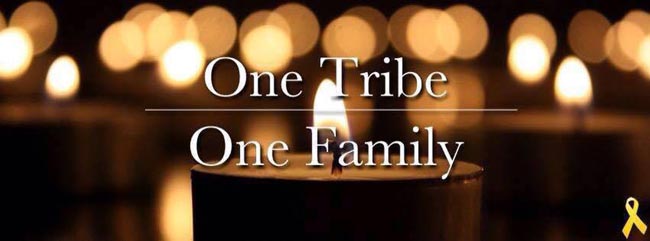To me, Paul Soutter ’17 was one of those people who weaves in and out of your life, coming and going, but always leaving a profound impact. I met him fall of freshman year, and we remained friends until his recent death. I was constantly touched by the ways in which Paul spread so much of his light and generosity in what seems like the smallest ways. One instance of this was last summer when my great aunt died. Paul sent me a long and thoughtful Facebook message not only offering expressions of sympathy, but also acknowledging that often in the grieving process, these condolences can seem hollow and useless. He reached out by offering to lend an ear if I wanted to talk and his presence if I just did not want to be alone. Exactly a week before his funeral, I ran into Paul at the Sadler Center and he offered congratulations on my first blog and promised to listen to some of my music suggestions. This was the Paul I am proud to say was my friend.
As I grieve and contemplate Paul’s death, I have had to come to terms with my own struggles with mental illness and how I handle them. Like many people on the College of William and Mary campus and across the country, I live with an anxiety disorder. There are days when getting out of bed seems out of the question, when I’m so overwhelmed by general panic about things and events that seem trivial, and when I have negative feelings and thoughts so persistent that I don’t understand how I function day to day with this disorder. Then there are days when I feel so normal that my anxiety doesn’t even seem to exist, even though I know it’s always there. I’ve accepted my anxiety as a manageable part of my life because I take the necessary time to assess my needs and take care of myself. It’s by no means easy, and I’m not always okay, but this journey has taught me that it’s okay to regularly see a therapist, it’s okay to be on medication, and most of all, it’s OKAY to not be okay sometimes.
I owe a great deal of credit regarding my anxiety management to my supportive family and friends, but what happens when love and support isn’t enough? Should we hold ourselves responsible for Paul’s death in any way because we didn’t tell him we loved him enough, or let him know that we were available if he needed someone to talk to? Was the College’s intense academic environment solely to blame? I don’t think either of these is the case. A fundamental human flaw is that we believe we can — and do — have the solution to everything. Talking to Paul or telling him he was loved and valued would not have rid him of his demons, nor would it have alleviated the anguish he felt. And while academic stress can undoubtedly exacerbate feelings of hopeless and despair, it would be inaccurate to conflate this factor with mental illness or assume there is a causal relationship. I believe that although Paul ended his life, he was ultimately killed by his depression. We have yet to recognize that mental illness can be terminal, and as much as we don’t want to believe it, we can’t save everyone.
This piece does not attempt to explain why we’ve lost so many people to suicide this past school year. Instead of overanalyzing the “whys” and “what ifs,” we owe it to ourselves and to Paul, Saipriya, Peter and the countless other students we’ve lost to cherish and honor the memories we have of them. There is no one to blame for suicide but mental illness itself, and time and time again we learn the importance of self-love and love from community in securing a healthy and hopeful future for ourselves.

